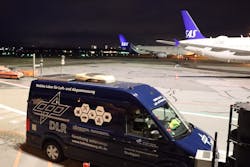Large-scale international experiment at Copenhagen airport shows biofuel improves air quality
COPENHAGEN - Bio-based aviation fuel reduces the number of ultrafine particles, improving air quality. That is one of the conclusions drawn from a large-scale international experiment at Copenhagen Airport, AviationPros reports. Continue reading original article.
The Military & Aerospace Electronics take:
1 November 2023 - Researchers measured an aircraft with 34 percent bio-based fuel, SAF, in the tank while it was taxiing between the runway and the gate at the airport. Ground measurements show a reduction in the emission of ultrafine particles by about 30 percent.
"These are really good news. It's an important discovery that sustainable aviation fuel has an impact on air quality. We already know that it helps reduce CO2 emissions, so this is another significant benefit of transitioning aviation to sustainable fuels," said Christian Poulsen, Acting CEO at Copenhagen Airport.
Starting from 2025, there will be a requirement that all aircraft departing from an EU airport must have a 2 percent blend of SAF. The blending requirement will steadily increase towards 2050, where a 70 percent blending is mandated.
"The EU agreement is a crucial step towards a green transformation of aviation. But it also emphasizes the need to kickstart the production of sustainable aviation fuels. We will need development and production to achieve our common goals for transforming the entire aviation industry," said Poulsen.
Related: Technology cooperation for aviation fuels of the future
Related: New Rolls-Royce engine for hybrid-electric flight completes successful first fuel burn
Related: Boeing, NASA, United Airlines to test sustainable aviation fuel benefits
Jamie Whitney, Senior Editor
Military + Aerospace Electronics
